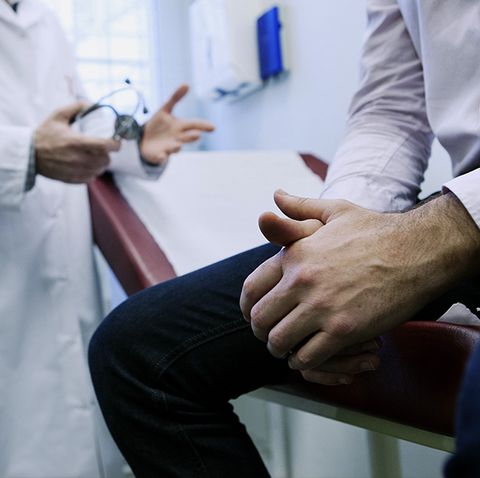
Guys, let’s talk about male menopause.
Yes, you read that right. You’re probably scratching your head, thinking, “Isn’t menopause something women get?” Not quite. Although it’s not a legit diagnosis in the medical world, men can go through a version of menopause that’s similar to what women experience.
What Is Male Menopause?
“In technical terms, there is no male menopause, but there are specific changes that occur at the age of 50 and over that are reminiscent of what women are going through,” says Dr. Damian Sendler, PhD, an expert in sexology.
“For women, the main control comes from the estrogen levels, which decreases steadily after the age of 45, eventually coming to very low levels at 55,” he explains. “The consequences are hot flashes, sweating, poor quality of skin, vaginal dryness, and decreased libido. Similar symptoms affect men, though not as drastically as it affects women.”
What Are the Symptoms of Male Menopause?
Unfortunately, “male menopause” can lead to difficulties in bed and a somewhat compromised appearance.
“Men lose hair, have difficulty urinating, and have higher risk of prostate cancer, the quality of skin decreases, and men are more likely to ‘look tired’,” says Sendler. They also tend to experience a decrease in physical strength and sexual performance.
Watch out for an enlarged prostate:
When guys hit their mid-50s, their prostates tend to enlarge, which can lead to a few unpleasant male menopause symptoms. The size of the prostate is regulated by androgens, specifically a conversion product of testosterone called 5-DHT. “Through little-known mechanisms, the fluctuations in the levels of DHT cause the prostate to start growing in size after about the age of 45,” he says.
And this can make it hard to control your pee. “Men tend to be more leaky as they age, meaning that changes in prostate size cause them not be able to hold urine for extended period of time,” he explains.
Changes to your sex life:
Sexual performance often decreases as well, due to challenges with getting and maintaining erections. “There is decrease in physical strength and impinging on the nervous system responsible for maintaining erections,” Sendler says.
The heart can’t work as effectively with age, either — which could also take a toll in the bedroom. “The heart is a pump that, just like any car engine, becomes a less effective pumping unit,” he says. When the pumping mechanism of the heart is weaker, there is less force to push in blood into spongy tissues of the penis, and you need that proper blood flow to the penis to get hard.
All of this can contribute to shorter sex sessions, and potential problems with ejaculation.
How Can I Treat Male Menopause?
Good news: You can usually treat or minimize the symptoms of male menopause. “The most common treatment is to decrease the size of the prostate through use of medications like 5-alpha-reductase inhibitors, which allow the musculature of the prostate to decrease,” Sendler says. (Not sure if you have an enlarged prostate? Here are 7 ways to tell.)
Some men experiencing difficulties in the bedroom turn to erection supplements like Viagra, but be sure to consult with a medical professional before you go down that road. Seriously.
You can also think about upping your physical activity. “I highly recommend physical exercises to increase physical strength and stamina, so that their sexual performance is maintained,” Sendler says. This might mean walking more, going for a jog, or even trying a barre class. Hey, some kegel exercises can’t hurt, either.
Source: Read Full Article
